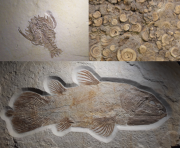Bouncing Back - a podcast by The University of Texas Marine Science Institute
from 2023-11-12T00:00

Life always seems to find a way. It inhabits every nook and cranny on Earth, from the upper atmosphere to the rocks below the bottom of the ocean. And even when there’s a disaster, it bounces back—sometimes in a big hurry.
An example comes from a quarter of a billion years ago, after the deadliest known mass extinction. Known as the Permian-Triassic event, it was the result of huge volcanic eruptions. They warmed the atmosphere and made the oceans far more acidic. That killed off most of the life on Earth, including 80 percent of life in the oceans.
Early evidence suggested it took millions of years for marine life to recover. But a recent study found a fully developed ocean ecosystem just one million years after the event.
Researchers dug up more than a thousand fossils in southwestern China. Layers of volcanic ash allowed them to date the fossils to about 251 million years ago—just a million years after the extinction event. The fossils represented an entire food web—everything from microscopic organisms to crabs and lobsters to fish up to about three feet long.
Some of the life matched the life found before the mass extinction—hardy survivors of a dangerous era. But much of the life looked a lot more like species that are alive today. That suggests that life adapted quickly.
Scientists had to suspend their fossil dig because of COVID-19. But they planned to return to the field in late 2023—looking for more evidence of life that found a way.
Further episodes of Science and the Sea podcast
Further podcasts by The University of Texas Marine Science Institute